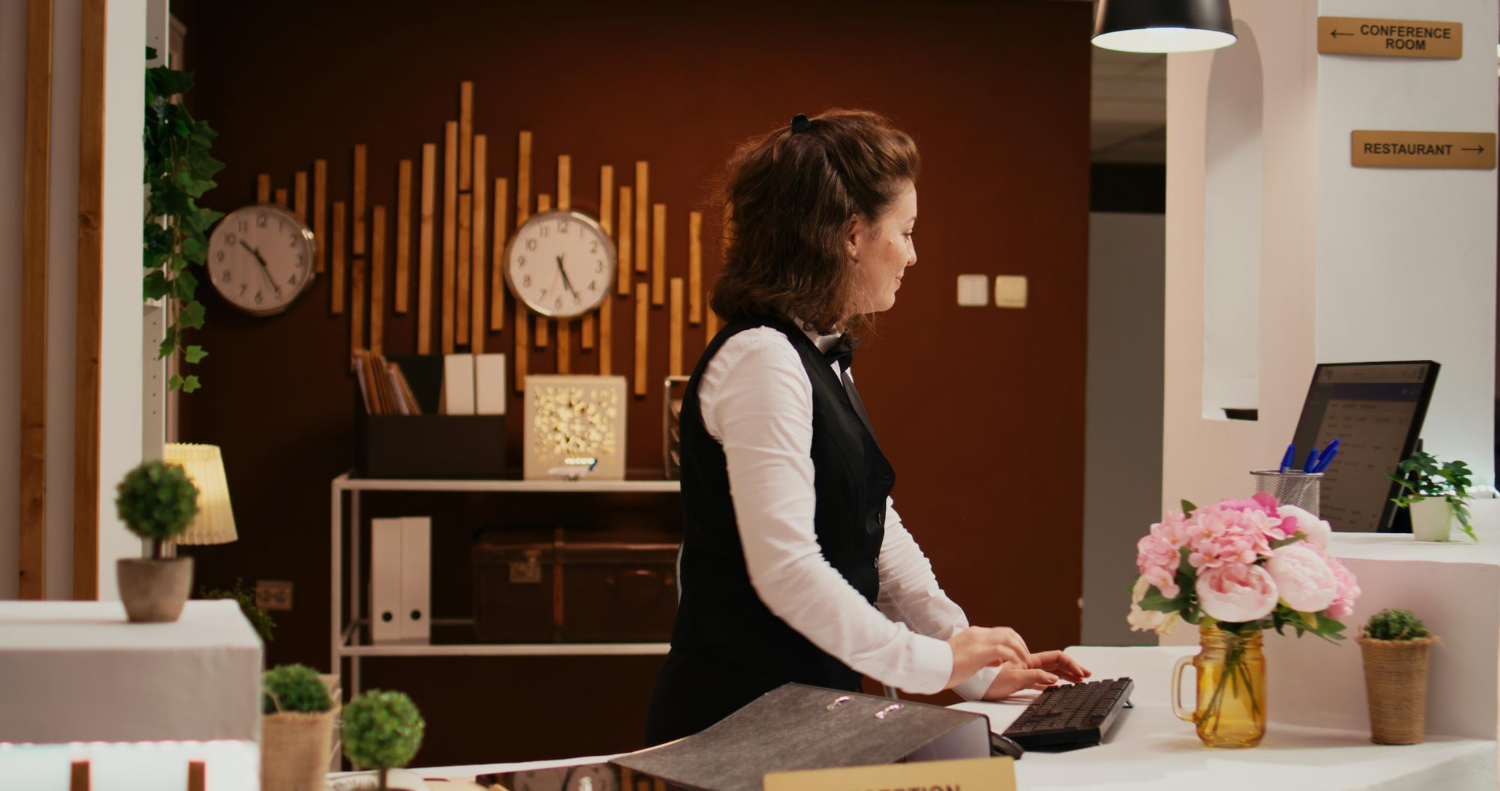The challenge of meeting and exceeding guest expectations is a constant in the hospitality industry. With the advent of digital technology, guests now seek more than just a place to stay; they crave a unique and personalised experience from the moment they consider booking until long after they’ve checked out. This evolving demand places a significant burden on hoteliers to innovate continuously and enhance their service offerings. Enter guest experience software—a game-changer in transforming how hotels interact with their guests, streamline operations, and ultimately, elevate the overall guest experience.
The Role of Hotel Guest Experience Software
Hotel guest experience software serves as the technological backbone of creating unforgettable guest experiences. This innovative solution integrates various aspects of hotel management and guest services, enabling hoteliers to offer seamless, personalised, and efficient services. From managing reservations and room preferences to facilitating mobile check-ins and outs, guest experience software automates and optimises operations, ensuring guests enjoy a hassle-free stay. Moreover, it provides a platform for communication between guests and hotel staff, allowing for real-time requests, feedback, and interaction. This not only enhances guest satisfaction but also empowers hoteliers to anticipate needs and address issues promptly, setting the stage for a memorable stay that guests are eager to repeat.
Benefits of Implementing Guest Experience Software
The adoption of guest experience software comes with a plethora of benefits that can significantly boost a hotel’s appeal and competitive edge. First and foremost, it enhances guest satisfaction by providing a tailored and responsive service. The ability to customise the guest experience based on individual preferences and history with the hotel elevates the level of personalization, making guests feel valued and understood.
Operational efficiency is another significant benefit. By automating routine tasks and streamlining communication channels, hotels can reduce wait times and operational bottlenecks, allowing staff to focus more on guest interaction and service quality. Additionally, the software’s data collection and analysis capabilities offer invaluable insights into guest behaviour and preferences, enabling data-driven decision-making that can further refine and improve the guest experience.
Furthermore, leveraging such technology positively impacts a hotel’s reputation. Satisfied guests are more likely to leave positive reviews and recommend the hotel to others, driving up bookings and revenue. In an age where online reviews can make or break a hotel’s reputation, ensuring an outstanding guest experience is more crucial than ever.
Key Features of Guest Experience Management Software
Selecting the right guest experience management software requires an understanding of the key features that drive its effectiveness. Personalised communication stands out as a fundamental feature, allowing hotels to send tailored messages and offers based on the guest’s profile and preferences. This can range from welcoming emails with personalised itineraries to post-stay thank you messages, fostering a deeper connection with guests.
Mobile check-in and checkout capabilities are also essential, offering guests the convenience and flexibility to manage their stay via their smartphones. This not only improves the guest experience by reducing wait times but also caters to the growing expectation for digital-first services.
Real-time feedback collection and management is another crucial feature. By enabling guests to easily share their experiences and concerns during their stay, hotels can quickly address any issues and make adjustments to improve service quality. This proactive approach to guest satisfaction can significantly enhance the overall experience and encourage positive reviews.
Lastly, integration capabilities with existing hotel management systems ensure a smooth operation and a single source of truth for guest information and preferences. This seamless integration is vital for delivering a consistent and personalised guest experience across all touchpoints.
These features, among others, are what make guest experience software an invaluable tool in the modern hospitality landscape. By enhancing personalization, operational efficiency, and guest satisfaction, this technology enables hotels to meet the high expectations of today’s travellers, setting them apart in a competitive market.
Choosing the Right Guest Experience Platform

Selecting the most suitable guest experience platform requires careful consideration of several factors. Compatibility with existing hotel management systems is paramount; the new software should seamlessly integrate with the current technology stack to avoid data silos and ensure smooth operations. Scalability is another critical factor, as the platform should be able to grow and adapt to the hotel’s evolving needs without requiring frequent replacements or extensive overhauls.
Hoteliers must also assess the user-friendliness of the software. Both staff and guests should find the platform intuitive and easy to use, ensuring widespread adoption and minimising the learning curve associated with new technology. Moreover, the level of customization offered by the software plays a vital role in tailoring the guest experience to meet individual preferences and expectations, further enhancing guest satisfaction.
Lastly, the reliability and support provided by the software vendor are crucial. A platform with strong customer support and a proven track record of uptime and performance can significantly impact the software’s effectiveness and the hotel’s ability to deliver consistent, high-quality guest experiences.
Implementing Guest Experience Software in Your Hotel
The successful implementation of guest experience software involves a strategic approach, starting with a comprehensive assessment of the hotel’s current operational processes and guest service delivery. This assessment helps identify areas where the software can have the most significant impact. Following this, a detailed plan for the rollout should be developed, including timelines, training schedules for staff, and communication strategies to inform guests about the new features and services available to them.
Training is a critical component of the implementation process. Staff should be thoroughly trained not only on how to use the software but also on how it enhances guest service and how they can leverage its features to improve guest satisfaction. Additionally, ongoing support and training should be provided to ensure staff remain proficient and can adapt to any updates or changes to the platform.
Equally important is the continuous evaluation of the software’s impact on guest experience and operational efficiency. This involves collecting and analysing guest feedback, monitoring key performance indicators, and making adjustments as necessary to ensure the software continues to meet the hotel’s needs and guest expectations.
Guest Experience: Enhancing Every Touchpoint
Smart guest experience software offers the opportunity to enhance every touchpoint in the guest journey, from pre-arrival to post-departure. Prior to arrival, personalised communication can set the stage for a memorable stay, providing guests with useful information about their stay and the local area, and offering them the opportunity to customise their experience.
During their stay, guests can benefit from features such as mobile check-in and checkout, real-time service requests, and personalised recommendations for dining and activities. These features not only improve the convenience and enjoyment of the guest’s stay but also provide hoteliers with valuable data on guest preferences and behaviour, enabling further personalization and service improvement.
After departure, the software can facilitate follow-up communication, including requests for feedback and offers for future stays. This not only helps maintain a relationship with the guest but also encourages repeat bookings and positive reviews, contributing to the hotel’s long-term success.
Personalising the Guest Experience with Technology
The power of guest experience software lies in its ability to personalise the guest experience at scale. By leveraging data on guest preferences, past stays, and behaviour, hoteliers can tailor every aspect of the guest’s experience, from room selection and amenities to communication and services. This level of personalization not only delights guests but also fosters a sense of loyalty and connection to the brand.
Furthermore, technology enables the delivery of personalised experiences in real-time. Whether it’s accommodating a last-minute room preference change or suggesting a dinner reservation based on the guest’s culinary tastes, the immediacy with which hotels can respond to and anticipate guest needs is dramatically enhanced by guest experience software.
By carefully selecting, implementing, and utilising smart guest experience software, hoteliers can significantly enhance the appeal of their properties. This not only boosts guest satisfaction and loyalty but also positions hotels to thrive in a highly competitive industry.
Gathering and Utilising Guest Feedback
Guest feedback is the cornerstone of any successful hotel operation, offering invaluable insights into guest satisfaction and areas for improvement. Guest experience software significantly streamlines the process of collecting, analysing, and acting on feedback. Real-time feedback mechanisms allow guests to communicate their experiences as they happen, providing hoteliers with the opportunity to address concerns immediately and turn potential negatives into positives.
Moreover, this continuous stream of data enables a more nuanced understanding of guest preferences and expectations, guiding strategic decisions and personalising the guest experience further. By actively soliciting and thoughtfully responding to guest feedback, hotels demonstrate a commitment to excellence that resonates with guests, fostering loyalty and encouraging positive online reviews.
Measuring the Impact of Guest Experience Software on Hotel Performance
Quantifying the impact of guest experience software is vital for justifying its adoption and guiding future investments. Key performance indicators such as guest satisfaction scores, repeat booking rates, and online review ratings offer direct measures of the software’s effectiveness. Additionally, operational metrics like check-in/out times and response times to guest requests can illustrate improvements in efficiency.
Analysing trends in these metrics over time provides clear evidence of the software’s contribution to hotel performance. This data-driven approach not only highlights the value of the investment but also identifies opportunities for further optimization, ensuring that the hotel continues to meet and exceed guest expectations in an ever-changing landscape.
Future Trends in Guest Experience Technology
The future of guest experience technology promises even more exciting possibilities for personalising and enhancing the guest journey. Innovations such as artificial intelligence and machine learning are set to offer unprecedented levels of customization, predicting guest preferences and automating personalised services. Virtual reality could transform the booking experience, allowing guests to explore rooms and facilities in immersive detail before making a decision. The Internet of Things (IoT) is poised to revolutionise room amenities and controls, providing guests with unparalleled convenience and control over their environment.
Staying informed about these trends and exploring how they can be integrated into the guest experience will be crucial for hotels looking to stay ahead of the curve. Embracing these technologies not only enhances guest satisfaction but also positions hotels as forward-thinking and innovative, attracting a broader range of guests and setting the stage for long-term success.
Conclusion
Elevating the guest experience through smart software solutions is no longer a luxury but a necessity in the competitive hospitality industry. By embracing guest experience platforms, hotels can unlock a new level of personalization, efficiency, and guest satisfaction. The insights gained from real-time feedback and performance metrics further empower hoteliers to refine and perfect their offerings.
Take the leap today and begin exploring how guest experience software can transform your hotel. With the right approach and technology, you can create unforgettable experiences that keep guests coming back for more. Let’s redefine hospitality together, one guest at a time.
